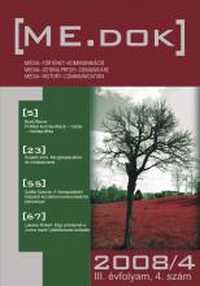A szociográfia erdélyi alakváltozatai
Transylvanian versions of Sociography
Author(s): Péter CsekeSubject(s): Media studies, Sociology
Published by: Medea Egyesület
Keywords: Sociography;Transylvania;
Summary/Abstract: Sociography, analyzing the national communities that dropped out from the European development, is an important part of the documentary literature. It is a typically Central and Eastern European genre.The Hungarian Sociography’s generative period can be put between 1936 and 1938. In the beginning of the 1970’s appeared a new wave in this field, which resulted in the restart of the Discovery of Hungary, but it also quickened the widening of genre-typology too. Henceforth the author is drawing the Sociography’s main stages by presenting and making reference to István Horváth’s (1909–1977), András Sütő’s (1927–2006) and György Beke’s (1927–2007) works. By the end of the 1990’s this genre, the investigative journalism, gets into the journalist-education’s schedule at the Faculty of Political Science. From that point theoretical interest intensified with such a magnitude that it became one of the basic disciplines of graduate studies in media sciences. Beside the theoretical inquiry a specific gap can be observed in the genre’s history, namely the changes and the lack of changes after 1989 have not been recorded in Sociographyc studies. It is well known that the cultivation of Sociography requires time and financial resources, and after the millennium “time seeded up” narrowing the opportunities to investigate and understand the deeper structures of the phenomenon’s taking place in the macro and micro word surrounding us. Perhaps this is why Sociography with its large history is fading in the background nowadays.
Journal: ME.DOK Média-Történet-Kommunikáció
- Issue Year: III/2008
- Issue No: 4
- Page Range: 13-22
- Page Count: 10
- Language: Hungarian

